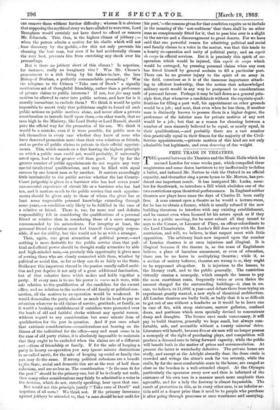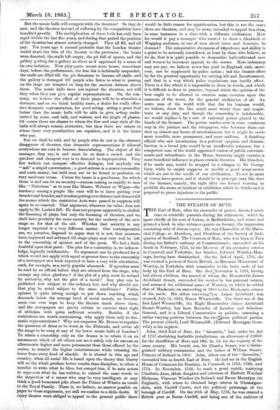FREE TRADE IN THEATRES.
THE quarrel between the Theatres and the Music Halls which has amused London for some weeks past, which compelled three magistrates and some dozen barristers to try ineffectually to define a ballet, and induoed Mr. Norton to visit the Oxford in an official capacity, and thereafter sing aprose hymn to Mr. Morton, has pro- duced one important result. It has instigated Mr. Locke, mem- ber for Southwark, to introduce a Bill which abolishes one of the two restrictions upon theatrical performances. In England neither theatres nor plays have since the days of Charles H. been really free. A man cannot open a theatre as he would a lecture-room, for he has to'obtain a licence, which is usually refused if the new building threatens to interfere with any existing establishment, and he cannot even when licensed let his actors speak as if they were in a public meeting, for he must submit all they intend to says to the Censor, or Licenser of Plays, an officer subordinate to the Lord Chamberlain. Mr. Locke's Bill does away with the that restriction, and will, we believe, in that respect meet with little opposition. The arbitrary limit now imposed upon the number of London theatres is at once injurious and illogical. It is illogical because if the theatre is, as the mass of Englishmen believe, a place of harmless amusement, or even of education, there can be no harm in multiplying theatres ; while if, as a section of society believes, theatres are wrong in se, they ought to be suppressed altogether. It is injurious to the lessees, to the literary craft, and to the public generally. The restriction virtually creates a monopoly, which compels the lessees to pay the most exorbitant rents, frequently twice or even thrice the amount charged for the surrounding buildings—it rises in one case, we believe, to 11,000/. a year—and debars them from trying an experiment greatly wanted, a new style of theatrical architecture. All London theatres are badly built, so badly that it is as difficult to get out of one without a headache as it would be to leave one in case of fire, with steep staircases, narrow galleries, confined doors, and porticoes which seem specially devised to concentrate damp and draughts. The licence once made unnecessary, it will pay to build theatres, generally we hope smell, but always com- fortable, safe, and accessible without a twenty minutes' drive. Literature will benefit, because five or six men will no longer possess a monopoly of the right of purchasing plays, and competition will produce a demand sure to bring forward capacity, while the public will benefit both in the matter of prices and accommodation. At present the latter is wretchedly defective. The private boxes are stuffy-, and except at the Adelphi absurdly dear, the dress circle is crowded and wrings the sitter's neck far too severely, while the stalls, by far the most comfortable seats in the house, are ranged as close as the benches in a well-attended chapel. At the Olympic particularly the spectator every now and then is informed of the existence of his own toes in a manner much more emphatic than agreeable, and for a lady the footway is almost impaesable. The result of protection in this, as in every other case, is an inferior ar- ticle sold at a dearer price than it need be to people who purchase it after going through processes at once wearisome and annoying. But the music halls will compete with the theatres? So they do now, and the theatres instead of sufferingby the competition have benefited greatly. The multiplication of these halls, has only been rapid within the last five years, and during that period the position of the theatres has almost entirely changed. They all fill, and all pay: Ten years ago it seemed probable that the London theatre would share the fate of • the theatre in the provinces ; the boxes weradeserted, the stalls left empty, the pit full of spaces, and the gallery getting for a gallery as silent as if oppressed by a sense of its own isolation. Now play-goers secure seats hours, sometimes days, before the performance, the free list is habitually suspended,. the stalls are filled till the pit threatens to become all stalls, and the gallery is thronged till people who listen to what is passing on the stage are tempted to long for the ancient dulness above them. The music halls have not injured the theatres, nor will they- when they can give regular representations. On the con- trary, we believe the effect of their plays will be to stimulate a dormant, and as we think healthy taste; a desire for really effec- tire. dramatic representation, for good acting, acting a great deal better than the music halls will be able to give, acting undis- turbed by noise, and talk, and waiters, and the jingle of glasses. Of: course there are classes to whom the free and easy style of the halls will always remain attractive, but then there are others to whom those very peculiarities are repulsive, and it is the latter who pay.
But we shall be told, and by people who do not in the abstract disapprove of theatres, that dramatic representations if allowed everywhere are sure to become demoralizing. The object of the manager, they say, is and must be to draw a crowd, and the quickest and cheapest way is to descend to improprieties. Very few writers can compose effective dialogue, but anybody can 4‘ salt" a stupid conversation ; a good actress is a scarce commodity and costs money, but bold ones are to be found in profusion on very moderate terms. Unless the lessee is a gentleman, for which there is and can be no-security--success coming as rapidly to men like "Nicholson" as to men like Messrs. Webster or Wigan—the tendency among a people like ours will be to farce getting ever broader and broader, and muslins getting ever thinner and thinnertill the scenes which: the restrictive Acts were passed to suppress will again be re-enacted. That argument, whatever its value, does not apply to Mr. Locke's Bill. He does not propose apparently-to abolish the licensing of plays, but only-the licensing of theatres, and we shall have. precisely the same security for the modesty of the new -stage. as for that of the old. Whether that security is any longer required is a very different matter. Our contemporaries are, we perceive, disposed to argue that it is not, that manners have improved and softened till stage-plays may very well be left to the censorship of opinion and of the press. We feel a little donbtful upon that-point. The plea for a censorship is, we icknow- ledge, logically indefensible. No argument can be produced for it which would not apply with equal or greater force to the censorship 'of a newspaper or a book expected to have a very wide circulation, such, for example, as a really popular almanack. If speeches must be read by an official before they are uttered from the stage, why -exempt any other platform? if the plot of a play must be revised by authority, why not the plot of a novel ? Any play can be published now subject to the ordinary law, and why should not that play be acted subject to the same conditions? Public opinion is quite strong enough to put down anything which descends below the average level of social morals, no Govern- ment can ever hope to keep the theatre much above them, and the newspapers are pretty certain to exercise their right of criticism with quite sufficient severity. Besides, if the restrictions are worth maintaining, why apply them only to, dra- matic representations ? Why not empower Mr. Donne to regulate the quantum of dress to be worn at the Eldorado, and revise all the songs to be sung it any of the lower music halls of London? To retain a censorship only on the drama is to retain it on an amusement which of all others can most safely rely for success on allurements higher and more permanent than those offered by the casino, to restrict the higher entertainment while releasing the lower from every kind of shackle. It is absurd in this age and 'country, when all social life is based upon the theory that liberty will on the whole produce better results than discipline, to allow a novelist to write what he likes, but compel him, if he asks actors to represent what he has written, to submit the same words to the inspection of a censor who may be very intelligent, or may think a good-humoured joke about the Prince of Whales an insult to the Royal Family. There is, we believe, no answer possible on paper to these arguments, yet still we confess to a little doubt. If e'Tery theatre were obliged to appeal to the general public there would be little reason for apprehension, butthis is not the ease; there are theatres, and may be more, intended to appeal to a class, in some instances to a class with a different civilization. Llow far would it pay a manager who wanted to draw a Shadwell or Wapping audience, or one of men about town and demirept, to descend? The comparative cheapness of itnpudence and ability is a point to be seriously considered, at least by those who believe, as we do, that it is quite possible to demoralize half-cultivated men and women by incessant appeals to the senses. Mere indecency may not pay, we believe never has paid in England, and, more- over, can be suppressed by police action ; but the theatre' offers by far the greatest opportunity for uniting wit and licentiousnegs, and that in a way which police regulations can_ hardly affect. There is a line which it is impossible to draw in words, and which it is difficult to draw in practice, beyond whioh the opinion of the best ought to be allowed to exercise some coercion upon the manners of the worst, for the general civilization of all. An acute man of the world with that for his business would, we believe, draw the line much more wisely than any- magis- trate or any jury, and though the censorship is indefensible, we would replace it by a sort of visitorial power placed in the hands of the licenser. The power resides now in some cumbrous way in the justices and the ratepayers, who between them can shut up almost any house of entertainment, but it might be. made more sensible, more permanent, and more uniform. A finicking official who saw insurrection in a political epigram and demora- lization in a broad joke would be an insufferable nuisance, but a competent man of the world appointed visitor of public entertain- ments and subordinate to the Home Secretary might exercise a most beneficial influence in places outside- theatres. His blunders, if he made any, would be stopped by a whisper to Sir George Grey, while he might suppress or modify a good many scenes which are not to the credit of our civilization.. To act he must of course have power, and it should be in principle very like that of the licenser, namely, the right after one formal warning to prohibit the scene or incident or exhibition which he thinks and is prepared to prove injurious to the public.































 Previous page
Previous page